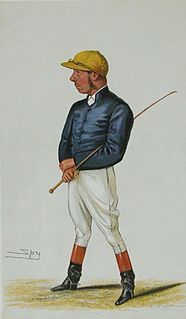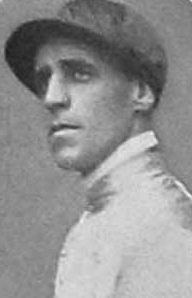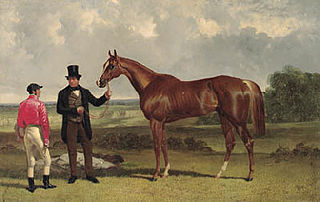
Elnathan "Nat" Flatman, born Holton St. Mary, Suffolk, was the first Champion flat racing jockey of Great Britain. He began his thirty-four-year racing career as an apprentice jockey at age fifteen and by 1840 he was the dominant rider in British racing, winning the Champion Jockey title thirteen years in a row. During his career, Flatman won the patronage of many significant owners, including Lord George Bentinck, the Earl of Chesterfield, Admiral Rous, Lord Stradbroke and Lord Derby. For these owners, and others like them he won most of the important Thoroughbred horse races in England, including ten Classics, and some significant races in France. He continued to ride until the paddock accident that incapacitated him and ultimately led to his death at the age of 50.
Doug Smith was an English flat racing jockey and trainer. During his career he was champion jockey 5 times finishing second on the riders' list 7 times, riding a total of 3,112 winners. In addition he was champion apprentice in 1937.
Geoff Lewis is a Welsh retired jockey who was born in Talgarth, Breconshire.

George Fordham (1837–1887) was a British flat racing jockey. He was Champion Jockey every year between 1855 and 1863, as well as four other occasions in his own right and once as joint champion. He then won the Derby in 1879, won the Oaks five times, and the Grand Prix de Paris three times. His career high was 165 wins in 1862. He was described in 1910 as "one of the greatest jockeys of all-time".

Black Jester (1911–1928) was a British Thoroughbred racehorse and sire, best known for winning the Classic St Leger Stakes in 1914. The colt won nine times from twenty-three races in a track career which lasted from 1913 until October 1915. Black Jester was one of the leading two-year-olds of 1913 when he won both Molecomb Stakes and the Richmond Stakes at Goodwood. As a three-year-old he finished third in the 2000 Guineas and was unplaced in The Derby before winning the Sussex Stakes at Goodwood and the St Leger at Doncaster in September. In 1915 he won the City and Suburban Handicap and the June Stakes, a wartime substitute for the Coronation Cup. He became increasingly difficult to train and at the end of the season he was retired to stud where he became a successful sire of broodmares.

Joseph Childs (1884–1958) was a French-born, British-based flat racing jockey. He won fifteen British Classics in a 35-year career, the last ten years of which were spent as jockey to King George V. He was known for riding a slow, waiting race, and also for having a short temper which regularly saw him at odds with his trainers and owners.
Charles William Reginald Spares, also commonly known as Chuck Spares, was a British jockey. Although predominantly a National Hunt jockey, his biggest victory came on the flat, when he won the 1951 Epsom Derby on Arctic Prince.

Job Marson (1817–1857) was an English classic-winning jockey, whose most famous partnership was with Voltigeur, winner of the 1850 Derby and St Leger.
Alfred Day was a British classic winning jockey. He won seven classics between 1849 and 1859, including the Derby on Andover, and was nicknamed "King Alfred" for his success.

Ralph "Geordie" Bullock was a Derby-winning British jockey.
Frederick George Allsopp was a British Derby-winning jockey.
John Daley was a three-time British Classic winning jockey, who most notably won The Derby/Oaks double in 1867.
John Howe Osborne, also known as John Osborne Jr. was a multiple British classic winning jockey. He was the most successful and most popular jockey in the north of England in the second half of the 19th century. His riding career lasted 46 years.

Frederic E. Webb (1853–1917) was a British Classic winning jockey.
Joe Marshall was a flat racing jockey, who won the 1929 Derby on Trigo.
Edwin Piper was a British flat racing jockey, who won the 1913 Epsom Derby, also known as the "Suffragette Derby" due to the death of suffragette Emily Davison during the race, on Aboyeur.

Michael Beary was an Irish flat racing jockey, who won four British Classics and eight Irish Classics in a career that spanned from the 1910s to the 1950s. He was Irish Champion Jockey in 1920.
Eric Ephraim Smith was an English flat racing jockey, who rode over 2000 winners, including the winners of three Classics, in a career spanning over 30 years.

Frederick Edward Rickaby was an English flat racing jockey, who won three fillies' Classics. He is usually referred to as Fred Rickaby Sr. to distinguish him from his son and grandson, both successful jockeys in their own right.
Tommy Carey was a Derby winning flat racing jockey.









